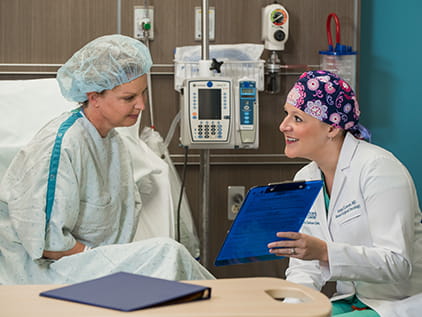- Home
- News Room
- Patient Stories Search Page
- Samantha Hardisty: Early Diagnosis Leads to Effective Breast Cancer Treatment
August 13, 2019
Samantha Hardisty has dealt with polycystic ovary syndrome, or PCOS, for years. PCOS is a hormone disorder that causes enlarged ovaries with cysts on the outer edges.
So when a breast lump was discovered during her annual exam last year, Samantha didn't get overly excited about it, especially since she had no family history of breast cancer.
Timely breast cancer diagnosis
"I had gone for my well-woman appointment the year before, and everything was fine," says Samantha, 30, of Gladstone, Missouri.
During this year's office visit, Samantha asked to have her breast cyst checked because she noticed it seemed larger. That's when her doctor suggested she get a mammogram. Her mammogram results indicated that Samantha needed further evaluation, including a biopsy. She met with a surgeon at another healthcare facility in June 2017. He performed a lumpectomy and removed 4 lymph nodes. Test results revealed she had stage 2, ER+/PR+/HER2+ cancer and 1 affected lymph node.
Looking for answers
After her initial surgery, Samantha sought a second opinion for her treatment with Qamar Khan, MD, breast medical oncologist for The University of Kansas Cancer Center. Dr. Khan recommended the treatment plan Samantha selected.
"I immediately felt like Dr. Khan and the people at The University of Kansas Cancer Center were attentive and provided me with all of the details I needed. They took it step by step, and I loved that! When you're first diagnosed with cancer, you have no idea what you're doing, but they were all compassionate and informative," says Samantha.
Dr. Khan stepped in to provide additional treatment to prevent the spread of future cancer cells during her lifetime.
"Some cancer cells hide in other cells, dormant until circumstances are right for them to develop later," explains Dr. Khan. "The cure rate with Samantha's form of cancer is 95% when adjuvant treatments (chemotherapy, radiation and Herceptin®) follow surgery. She should never have to deal with breast cancer again."
Samantha is almost through her chemotherapy treatments (a series of 6) and will start radiation for 5 weeks afterward. She will then receive Herceptin, which targets HER2 cells, for a year.
The perfect crucial catch
"Samantha is the perfect example of a 'Crucial Catch' patient," says Dr. Khan. "When caught early, her type of cancer is curable. But, even just 10 years ago, this particular type of breast cancer was the most dreaded and aggressive for patients. But we now know how to target it and can offer a very high cure rate.”
Dr. Khan credits Samantha for her positive attitude and optimism about her treatment and outcome.
"I have so much support; it's hard not to be positive," says Samantha. "I come from a large Italian family – lots of cousins and relatives. And, I have a lot of friends. And even friends of friends and people I don't know have come forward with offers to help. It's hard not to be positive with all of that."
Chiefs Crucial Catch experience
Recently, Samantha and her husband, Andy, attended a Crucial Catch luncheon and Chiefs practice in addition to the Chiefs game they will attend October 15. Even though meeting Chiefs players and getting their autographs were a definite highlight, Samantha said meeting other patients with different types of cancer was the best part of the event.
"Some of these people have been dealing with cancer for years. They are inspiring," she says. "I even learned some of the Chiefs players have had cancer themselves. We are all touched by it in some way."

Your best option for beating cancer
The Women’s Cancer Center at The University of Kansas Cancer Center focuses on breast and gynecologic cancers, providing specialized care to women.
